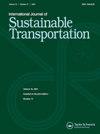Sustainable transportation through data science: Case studies from the automotive industry
IF 3.1
3区 工程技术
Q2 ENVIRONMENTAL STUDIES
International Journal of Sustainable Transportation
Pub Date : 2025-01-02
DOI:10.1080/15568318.2024.2443821
引用次数: 0
Abstract
The automotive industry is undergoing transformative changes propelled by the progress in technology, considerations for the environment, and the evolving tastes of consumers. This quantitative research endeavors to investigate the impact of data-driven advancements in the automotive sector. The research methodology employed a purposive sampling technique, targeting diverse stakeholders within the Chinese automotive industry. A structured questionnaire served as the primary data collection tool. Through direct interactions and visits, 900 questionnaires were distributed over three days, yielding a robust response of 850 returned surveys. Following the removal of invalid responses, the study culled valid data from 800 participants. The collected data underwent analysis using SPSS statistical software. Findings reveal significant trends in the industry, such as the increasing adoption of electric vehicles, evolving customer preferences for advanced features, and the potential impact of ride-sharing and car-sharing services on individual car ownership. Furthermore, the investigation identifies the crucial role of data analysis, predictive analytics, IoT devices, and big data in shaping various aspects of the automotive sector. The study’s novelty lies in its quantitative approach, providing objective insights into demographic characteristics, industry trends, and participants’ perspectives. The study’s exploration of data-driven design processes and their role in fostering innovation and user-friendly vehicles adds a distinctive layer to understanding the transformative impact of data science on automotive development. Overall, this research contributes valuable knowledge for industry practitioners, policymakers, and scholars interested in the intersection of data science and automotive advancements.
通过数据科学实现可持续交通:来自汽车行业的案例研究
在技术进步、对环境的考虑以及消费者不断变化的品味的推动下,汽车行业正在经历革命性的变化。这项定量研究旨在调查数据驱动的进步对汽车行业的影响。研究方法采用有目的的抽样技术,针对中国汽车行业的不同利益相关者。一个结构化的问卷作为主要的数据收集工具。通过直接互动和访问,在三天内分发了900份问卷,得到了850份回复。在剔除无效回答后,该研究从800名参与者中剔除了有效数据。收集的数据使用SPSS统计软件进行分析。调查结果揭示了行业的重要趋势,例如电动汽车的日益普及,消费者对先进功能的偏好不断变化,以及拼车和汽车共享服务对个人汽车保有量的潜在影响。此外,该调查还确定了数据分析、预测分析、物联网设备和大数据在塑造汽车行业各个方面的关键作用。这项研究的新颖之处在于其量化方法,对人口特征、行业趋势和参与者的观点提供了客观的见解。该研究探索了数据驱动的设计过程及其在促进创新和用户友好型车辆方面的作用,为理解数据科学对汽车开发的变革性影响增加了一个独特的层面。总的来说,这项研究为对数据科学和汽车进步的交叉感兴趣的行业从业者、政策制定者和学者提供了宝贵的知识。
本文章由计算机程序翻译,如有差异,请以英文原文为准。
求助全文
约1分钟内获得全文
求助全文
来源期刊
CiteScore
8.90
自引率
2.60%
发文量
56
期刊介绍:
The International Journal of Sustainable Transportation provides a discussion forum for the exchange of new and innovative ideas on sustainable transportation research in the context of environmental, economical, social, and engineering aspects, as well as current and future interactions of transportation systems and other urban subsystems. The scope includes the examination of overall sustainability of any transportation system, including its infrastructure, vehicle, operation, and maintenance; the integration of social science disciplines, engineering, and information technology with transportation; the understanding of the comparative aspects of different transportation systems from a global perspective; qualitative and quantitative transportation studies; and case studies, surveys, and expository papers in an international or local context. Equal emphasis is placed on the problems of sustainable transportation that are associated with passenger and freight transportation modes in both industrialized and non-industrialized areas. All submitted manuscripts are subject to initial evaluation by the Editors and, if found suitable for further consideration, to peer review by independent, anonymous expert reviewers. All peer review is single-blind. Submissions are made online via ScholarOne Manuscripts.

 求助内容:
求助内容: 应助结果提醒方式:
应助结果提醒方式:


